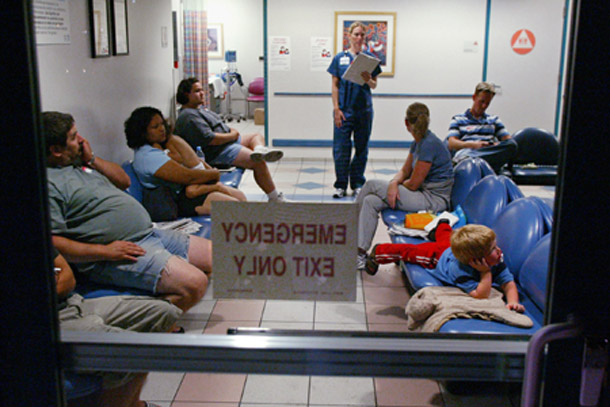Share this
 Expect longer waits here, with states still picking up the tab.
Expect longer waits here, with states still picking up the tab.
The Medicaid expansion was meant to be one of the hallmark accomplishments of health-care reform. The Affordable Care Act will expand the program rapidly by subsidizing insurance for all Americans up to 133 percent of the poverty line, which will add an estimated 16 million new Medicaid enrollees. During the health-care debate, Democrats heralded the move for helping to bring the country closer than ever to achieving universal coverage.
But the Medicaid expansion has also become one of the biggest points of tension between the federal and state governments. The federal government will cover all the costs of the expansion until 2019, but the states will eventually be responsible for shouldering part of the
burden thereafter, as Medicaid has traditionally been a federal-state cost-sharing program. Many GOP state governments, along with a handful of Democratic ones, have complained that the expansion will bankrupt already cash-strapped budgets.
Texas, however, has taken such protestations a step further. Conservative state lawmakers are now demanding that the state drop out of the program altogether to alleviate the state’s $25 billion shortfall. If Texas went ahead with such a plan, it’s unlikely that the Medicaid program would entirely disappear, but its reimbursement rates would fall so low without state support that almost no one provider would accept the coverage, as Mike Tomasky explains.
What would justify such a move? The New York Times cites one veteran GOP state representative who’s pushing the idea: “We need to get out of it. And with the budget shortfall we’re anticipating, we may have to act this year.”
The underlying rationale is that sacrificing the health coverage of poor people would be a worthwhile move if it solves the state’s budget crisis. If you’re a purist in opposing the welfare state — even at significant human cost to the most vulnerable — it’s a logical argument to make. But even if we all agree the goal is fiscal solvency, there’s also a chance that gutting Medicaid could end up backfiring.
The uninsured poor have already been resorting to hospital emergency rooms for care, and hospitals, in turn, have relied on state governments to cover the costs. If Medicaid coverage were pared back, the hospital ER would likely become the de facto safety net: The number of uninsured ER visits would invariably rise, and the state government would end up paying the price anyway. Texas’s own comptroller, Susan Combs, has admitted as much: In a 2005 paper, she proposes that the state’s Medicaid should be slashed and hospital reimbursements upped instead. But ER visits are extremely expensive, and they won’t serve as a particular cost-effective solution to eliminating insurance, which at least gives patients other options for care.
To be sure, there’s no question that Medicaid has been costly for state governments, and it’s understandable that the lingering recession would make state officials feel panicky about the future expansion. There are deeper programs still: the cash-strapped program only pays providers 66 percent of Medicare reimbursement rates, making it hard for Medicaid patients to find doctors who accept their coverage. Such dilemmas strengthen the argument for simply federalizing the entire Medicaid program, protecting it from the ideological and fiscal battles on the state level.
But until the day comes that a better Medicaid overhaul is possible, states must also realize that simply trying to wash their hands of the problem by stripping Medicaid coverage from the poor — without providing a reasonable alternative — won’t be the answer either. The uninsured poor will continue to get sick. They will continue to seek out health care. And many institutions — including state governments — will still end up paying for it.
Update: As Ezra points out Texas already has the highest proportion of uninsured residents in the nation, at 27 percent. If the state dropped Medicaid, that would go up to 40 percent.
Suzy Khimm is a reporter in the Washington bureau of Mother Jones. Read more of her work here, and follow her on Twitter.
Share this
Contact Us
Have questions? Send us a private message using the form below.

